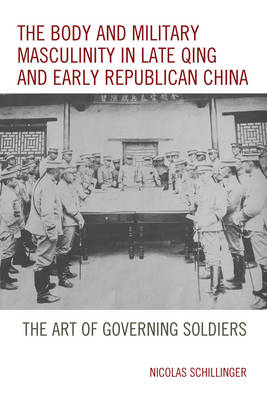
The Body and Military Masculinity in Late Qing and Early Republican China
The Art of Governing Soldiers
Seiten
2016
Lexington Books (Verlag)
978-1-4985-3168-9 (ISBN)
Lexington Books (Verlag)
978-1-4985-3168-9 (ISBN)
This study examines the cultural effects of China’s adoption of a European military model in the late nineteenth and early twentieth centuries. It argues that there was a conceptual reconfiguration of Chinese masculinity and citizenship and focuses on how the body was conceived, shaped by physical fitness and medical practices, and controlled.
In 1894–1895, after suffering defeat against Japan in a war primarily fought over the control of Korea, the Qing government initiated fundamental military reforms and established “New Armies“ modeled after the German and Japanese military. Besides reorganizing the structure of the army and improving military training, the goal was to overcome the alleged physical weakness and lack of martial spirit attributed to Chinese soldiers in particular and to Chinese men in general. Intellectuals, government officials, and military circles criticized the pacifist and civil orientation of Chinese culture, which had resulted in a negative attitude towards its armed forces and martial values throughout society and a lack of interest in martial deeds, glory on the battlefield, and military achievements among men. The book examines the cultivation of new soldiers, officers, and civilians through new techniques intended to discipline their bodies and reconfigure their identities as military men and citizens. The book shows how the establishment of German-style “New Armies” in China between 1895 and 1916 led to the re‐creation of a militarized version of masculinity that stressed physical strength, discipline, professionalism, martial spirit, and “Western” military appearance and conduct. Although the military reforms did not prevent the downfall of the Qing Dynasty or provide stable military clout to subsequent regimes, they left a lasting legacy by reconfiguring Chinese military culture and re‐creating military masculinity and the image of men in China.
In 1894–1895, after suffering defeat against Japan in a war primarily fought over the control of Korea, the Qing government initiated fundamental military reforms and established “New Armies“ modeled after the German and Japanese military. Besides reorganizing the structure of the army and improving military training, the goal was to overcome the alleged physical weakness and lack of martial spirit attributed to Chinese soldiers in particular and to Chinese men in general. Intellectuals, government officials, and military circles criticized the pacifist and civil orientation of Chinese culture, which had resulted in a negative attitude towards its armed forces and martial values throughout society and a lack of interest in martial deeds, glory on the battlefield, and military achievements among men. The book examines the cultivation of new soldiers, officers, and civilians through new techniques intended to discipline their bodies and reconfigure their identities as military men and citizens. The book shows how the establishment of German-style “New Armies” in China between 1895 and 1916 led to the re‐creation of a militarized version of masculinity that stressed physical strength, discipline, professionalism, martial spirit, and “Western” military appearance and conduct. Although the military reforms did not prevent the downfall of the Qing Dynasty or provide stable military clout to subsequent regimes, they left a lasting legacy by reconfiguring Chinese military culture and re‐creating military masculinity and the image of men in China.
Nicolas Schillinger is lecturer at the Institute of China Studies at the Free University of Berlin.
Chapter 1: Forging the Male Body: Drill in the New Armies
Chapter 2: Body, Space, and Daily Life
Chapter 3: Dressed to Kill: Uniforms, Masculinity, and Military Culture
Chapter 4: Making Real Men: Military Professionalism and Martial Spirit
Chapter 5: All Men Are Soldiers: Citizenship and Military Service
Chapter 6: School Reforms and the Education of Citizen-Soldiers
| Erscheinungsdatum | 27.10.2016 |
|---|---|
| Verlagsort | Lanham, MD |
| Sprache | englisch |
| Maße | 159 x 239 mm |
| Gewicht | 853 g |
| Themenwelt | Sachbuch/Ratgeber ► Geschichte / Politik ► Allgemeines / Lexika |
| Geisteswissenschaften ► Geschichte ► Regional- / Ländergeschichte | |
| Geschichte ► Teilgebiete der Geschichte ► Militärgeschichte | |
| Sozialwissenschaften ► Politik / Verwaltung | |
| ISBN-10 | 1-4985-3168-7 / 1498531687 |
| ISBN-13 | 978-1-4985-3168-9 / 9781498531689 |
| Zustand | Neuware |
| Haben Sie eine Frage zum Produkt? |
Mehr entdecken
aus dem Bereich
aus dem Bereich
Geschichte, Positionen, Perspektiven
Buch | Softcover (2023)
C.H.Beck (Verlag)
12,00 €
neueste Manipulationstechniken als Waffengattung der NATO
Buch | Softcover (2023)
Westend (Verlag)
24,00 €
Deutschlands Schwäche in der Zeitenwende
Buch | Softcover (2023)
C.H.Beck (Verlag)
18,00 €


